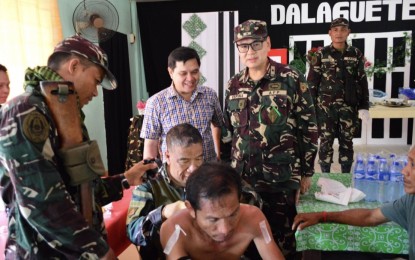
MEDICAL MISSION. A reservist doctor performs minor surgical operation during a medical mission in Dalaguete, Cebu in 2018 as Brig. Gen. Erik Miguel Espina, chief of 1901st Infantry Brigade Ready Reserve (right), and Mayor Alan Cesante (in civilian shirt) look on. Espina on Tuesday (August 4, 2020) said he is pushing for issuance of Annual Active Duty Training (AADT) for the reservists who will answer the call of President Rodrigo Duterte to serve in the front line battle against Covid-19. (File photo courtesy of 1901st Infantry Brigade Ready Reserve)
CEBU CITY – Reservists in Central Visayas are ready to answer the call of President Rodrigo Duterte to serve in the front line in the battle against the coronavirus disease 2019 (Covid-19), the highest-ranked Army reservist in the region on Tuesday said.
Brig. Gen. Erik Miguel Espina, chief of the 1901st Infantry Brigade Ready Reserve, said the plan of the national government to tap reservists as “relievers” for the regular personnel of the Armed Forces of the Philippines (AFP) and medical front-liners has now become “a necessity”, considering the exhausting fight against the viral disease.
He cited the long period of time that the front-liners have been working to prevent further contagion of the coronavirus in the Filipino communities since the onset of the public health crisis in March.
“Complacency and mistakes occur when AFP and PNP (Philippine National Police) are tired or exhausted," Espina told the Philippine News Agency, stressing the need for the reservists to become their able relievers.
He said “the reservists can perform multi-roles subject to real limitations,” citing the capabilities of Army reservists in the region to manage town-wide medical and civic action missions.
The 1901st Infantry Brigade Ready Reserve, he said, has already embarked on many medical missions in Cebu, Bohol and Negros Oriental, serving an aggregate of more than 60,000 indigent persons since 2012.
In its medical missions in far-flung areas of the three provinces, the reservist brigade joined naval, air force reservist, and the AFP Reserve Command’s 5th Administrative and Technical Service (5th TAS).
“Amidst the challenging fiscal cost government is confronted with, I am motioning for issuance of AADT (annual active duty training) orders with waivers to cut expected expenditures instead of reservists being mobilized and put on CAD (call to active duty). The 30-day AADT is extendible as well,” Espina said.
AADT refers to orders issued by its respective Community Defense Center of Army Reserve Command (ARESCOM) to reservists who will undergo 30-day active duty training while CAD is issued to reservists who are called to render active duty in certain period, mostly two years.
The chief of Army Reserve Command’s 7th Regional Community Defense Group, Col. Ricky Bunayog, told the PNA that the reserve force in Central Visayas “can handle it (serving the front-line) with our sheer number except for the requirements for medical practitioners which we don’t have”.
“For other Covid-19 front-line jobs, the Philippine Army reservists in Central Visayas will be useful. We just have to refine guidelines so we will be on the side of being useful than as burdens,” said Bunayog, a 2017 Metrobank Foundation Outstanding Filipino awardee. (PNA)
